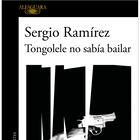A student waves the flag at a protest in Nicaragua in 2018.INTI OCON / AFP via Getty Images
Sergio Ramírez has been one of the literary, moral and political references of Spanish literature for decades. If we isolate the reading of the media echo and denounce the authoritarian regime of his country, corruption, the aberration of state violence in Nicaragua today, but extrapolated to any country and dictatorship; even if we ignore, as readers, the publication seized in his country of this, his latest novel, as well as the arrest warrant and conspiracy for inciting hatred and the integrity of his country by Ramírez; even so there is good news, because
Tongolele did not know how to dance
it is a piece of novel.
And it will continue to be so because in it there is nothing temporary - despite what it recounts in it, the 2018 uprising and the bloody repression that claimed 427 deaths, most of them students - but essential.
The denunciation of corruption, brutality, the fear of the victim but also of the executioners, the childish, cruel, ridiculous and paranoid game of power and its horror coven.
Structured in two parts
, Tongolele could not dance
Bring back Inspector Dolores Morales. It closes the trilogy that began with the superb Heaven cries for me (2008) and continued with Ya no one cries for me (2017). Morales is a veteran of the Sandinista struggle against Somoza - in a way, Ramírez's alter ego, an intellectual of the revolution who became vice president until 1990 - and who makes his living as a researcher in present-day Managua, impoverished and disappointed by the revolution. On this occasion, Morales and his partner, Rambo, are expelled from the country by order of Tongolele, head of the secret services. The duo turn around and enter their country wanting to resist and survive. We read, voraciously, that plot with a good handful of great secondary characters - Sofia, Lord Dixon, Father Pancho, the poet Lira,Monsignor Ortez… - as a preamble to the uprising against that esoteric dictatorship of Daniel Ortega and his wife, Rosario Murillo. A regime halfway between fascism, the broken revolution and a religion of crystal balls and omens - personified in the trees of life, those colored constructions with which Murillo planted Managua and its surroundings as a source of energy or a UFO track. -.
The book is, from start to finish, a superb display of an author who, close to his eighth decade of life, has the strength and the talent to build a complex and dependency novel at the same time. The quality of each page, the use of musicality always at the service of what is narrated, the tension and how it gives the information. It is an orally constructed book, where the characters speak or read what others have written and thus —almost never focused directly— we learn what is happening. At times it recalls the gale of the best novelist Vargas Llosa, but always being Sergio Ramírez, within his tradition and using ways and means to explain a novel in the year 2021.
Reading this book, the 2017 Cervantes Prize makes a lot of writers old who could be his children or grandchildren.
In addition, and although a priori the protagonist is Morales, Ramírez is lucid enough to realize that he has given birth to a fascinating character, Tongolele, and leaves him room to grow.
Shakespearean in spirit, this disgraced henchman - he does not know why, he does not know who or what for - is a magnet for the reader, a superb example of what an artist can do with words and story, empathizing with Tongolele, with his fear and his paranoia.
This novel supports readings and readers, and is a danger for both authoritarian politicians and lackeys and, to a lesser extent, of course, for those who continue to say that the crime novel is a minor genre.
Tongolele did not know how to dance
Sergio Ramírez
Alfaguara, 2021
344 pages.
18.90 euros
Find it in the bookstore
You can follow BABELIA on
and
, or sign up here to receive
our weekly newsletter
.















